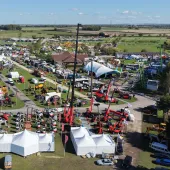CEA annual conference 2015

Innovation, productivity, technology and skills dominate Construction Equipment Association event
MORE than 150 delegates from the construction equipment sector attended the CEA annual conference at One Great George Street, London, home of the Institution of Civil Engineers, on Wednesday 18 November 2015.
Innovation, infrastructure, technology, skills, market prospects and investment were among the topics discussed at this year’s event, which once again was ably hosted by BBC broadcaster and journalist Nick Higham.
First to take the stage was Sir Neville Simms, chair of the Thames Tideway project, which will be London’s biggest construction project since the launch of Crossrail. Sir Neville said that construction work on the new 25km sewerage interception, storage and transfer tunnel, which will run up to 65m below the river, will begin in 2016 and is expected to take up to seven years to build, at a cost of £4.2 billion. The project will be one of the biggest employers in London and one in every 50 positions filled must be an apprentice.
Stephen Spencer, human resources director at GKN Land Systems, was next to address the conference. He explained a pilot scheme currently under way within the automotive sector which aims to place more than 1,000 level 3 apprenticeship candidates each year. Called the ‘Automotive Apprenticeship Matching Service’, it is essentially a clearing house for apprentices which will seek to match surplus high-calibre applicants to other apprenticeship opportunities with major OEMs.
David Phillips, managing director, Off-Highway Research, provided an insight into the world’s construction equipment market, which last year amounted to $93.3 billion in global sales and this year is predicted to fall to $84 billion. In particular, he noted China’s rapid decline and the country’s vast surplus of construction equipment and production capacity. He also predicted a bright future for India.
Next to speak was Richard Clement, planning manager with Komatsu UK, who introduced to the delegates to Komatsu’s intelligent machine range, which currently comprises three dozers and one excavator. Mr Clement explained how ‘intelligent’ machine control could save valuable time and money on job sites, whilst reducing pressure on the operator and improving site safety.
Dick Elsy, chief executive of the UK’s high-value manufacturing Catapult, talked about how catapults are bridging the gap between business and academia, helping to turn innovative ideas into reality by providing access to world-class research and development facilities and expertise that would otherwise be out of reach for many businesses in the UK.
Nick Boles MP (pictured), Minister of State for Skills and Construction, spoke about the Government’s skills agenda and commitment to apprenticeships. Mr Boles told delegates that today’s apprentices are tomorrow’s business leaders, so it is right to invest in securing their futures. He said the new apprenticeship levy is designed to level the playing field so every big company plays their part in delivering a new generation of skilled apprentices and industry-led training standards.
Bill Quigley, head of excavated & bulk materials for HS2, updated delegates on the project. With its £42 billion budget, delegates were keen to hear of the plant requirements for the project. For phase one, it is estimated that, at its peak, 636 articulated dumptrucks, 372 excavators and 124 dozers will be among the major items of plant required. These will be used to shift some 128 million tonnes of excavated material, of which, 90% will be reused on the project.
Paul Hardwick, head of business development at Calor Gas, spoke about the future of fuel technology and how Calor Gas could be introduced into construction equipment as an alternative to diesel. According to Mr Hardwick, off-highway equipment accounts for 14% of NOx emissions, while LPG delivers less NO2 than petrol and 80% less than diesel.
Finally, Nigel Baseley, President of the CEA and chair of the Association’s Skills Advisory Panel, introduced the CEA Skills Portal Toolkit, where companies can find advice on apprenticeship, funding, upskilling and outsourcing. He also introduced the SEMTA Apprenticeship Service – a one-stop employer solution for recruiting, developing and mentoring talented apprentices.









